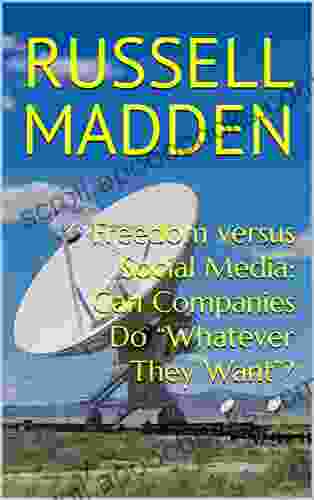Can Companies Do Whatever They Want? A Must-Read for Every Business Owner and Consumer

The rise of multinational corporations has sparked a global debate about the extent of corporate power and the ethical responsibilities of businesses. As companies wield immense influence over our lives, it becomes imperative to question whether they should be allowed to operate without limits. This article explores the complexities of corporate behavior, examining the legal, ethical, and societal dimensions of corporate actions.
In many jurisdictions, corporations are recognized as legal entities with rights and responsibilities similar to individuals. This legal framework grants corporations the freedom to engage in a wide range of activities, from entering into contracts to owning property. However, these powers are not absolute and are subject to legal constraints.
Antitrust laws, for example, aim to prevent monopolies and promote fair competition. Environmental regulations restrict corporate activities that harm the environment. Labor laws protect the rights of employees and limit the extent to which companies can exploit their workforce. These legal frameworks serve as guardrails, preventing corporations from acting in ways that are detrimental to society.
4 out of 5
| Language | : | English |
| File size | : | 2891 KB |
| Text-to-Speech | : | Enabled |
| Screen Reader | : | Supported |
| Enhanced typesetting | : | Enabled |
| Word Wise | : | Enabled |
| Print length | : | 12 pages |
Beyond legal obligations, many argue that corporations have a moral imperative to act ethically. This includes respecting human rights, protecting the environment, and contributing to the well-being of the communities in which they operate. Corporate social responsibility (CSR) initiatives have become increasingly common as companies strive to demonstrate their commitment to these principles.
However, critics argue that CSR efforts are often superficial and driven by public relations rather than genuine ethical concerns. They point to cases of companies engaging in unethical practices while maintaining a positive public image. This raises questions about the effectiveness of voluntary ethical standards and the need for more stringent regulatory oversight.
To fully grasp the potential consequences of unchecked corporate power, it is instructive to examine real-world examples of corporate misconduct.
- Volkswagen emissions scandal: Volkswagen manipulated emissions testing software to make its vehicles appear more environmentally friendly. This scandal exposed the lengths to which corporations may go to maximize profits, even at the expense of public health and environmental safety.
- Purdue Pharma opioid crisis: Purdue Pharma aggressively marketed its opioid painkillers, OxyContin, despite knowing of their addictive properties. The resulting opioid crisis has had devastating consequences for countless individuals and families.
These cases highlight the urgent need for effective oversight and accountability mechanisms to prevent corporations from engaging in harmful or unethical practices.
Despite the potential risks, some argue that corporations should have broad freedom to operate. They contend that:
- Economic growth: Unrestricted corporate activity drives economic growth and innovation, creating jobs and contributing to societal progress.
- Consumer choice: Corporations provide a wide range of goods and services, giving consumers greater choice and affordability.
- Free market: Competition among corporations promotes efficiency and drives down prices, benefiting consumers ultimately.
Advocates for increased corporate regulation argue that:
- Corporate power imbalance: Unchecked corporate power can lead to monopolies and unfair competition, harming consumers and stifling innovation.
- Societal harm: Corporations may engage in activities that harm the environment, exploit labor, or undermine public trust.
- Accountability: Corporations are often too large and complex to be held accountable for their actions, leading to impunity for unethical behavior.
The question of whether companies can do whatever they want is complex, with no easy answer. Striking a balance between corporate freedom and societal protection requires careful consideration of legal frameworks, ethical principles, and real-world cases of corporate misconduct.
Ultimately, the power of corporations should be tempered by strong regulatory oversight, ethical guidelines, and a commitment to accountability. Only through these mechanisms can we ensure that corporations serve the interests of society as a whole and not just their own narrow financial objectives.
This book delves even deeper into the intricate relationship between corporations and society, providing a comprehensive analysis of the legal, ethical, and societal implications of corporate behavior. Free Download your copy today to empower yourself with the knowledge and insights you need to navigate this complex landscape.
4 out of 5
| Language | : | English |
| File size | : | 2891 KB |
| Text-to-Speech | : | Enabled |
| Screen Reader | : | Supported |
| Enhanced typesetting | : | Enabled |
| Word Wise | : | Enabled |
| Print length | : | 12 pages |
Do you want to contribute by writing guest posts on this blog?
Please contact us and send us a resume of previous articles that you have written.
 Book
Book Novel
Novel Page
Page Chapter
Chapter Text
Text Story
Story Genre
Genre Reader
Reader Library
Library Paperback
Paperback E-book
E-book Magazine
Magazine Newspaper
Newspaper Paragraph
Paragraph Sentence
Sentence Bookmark
Bookmark Shelf
Shelf Glossary
Glossary Bibliography
Bibliography Foreword
Foreword Preface
Preface Synopsis
Synopsis Annotation
Annotation Footnote
Footnote Manuscript
Manuscript Scroll
Scroll Codex
Codex Tome
Tome Bestseller
Bestseller Classics
Classics Library card
Library card Narrative
Narrative Biography
Biography Autobiography
Autobiography Memoir
Memoir Reference
Reference Encyclopedia
Encyclopedia Brandi Lawless
Brandi Lawless Christopher Chantrill
Christopher Chantrill Billy Joel
Billy Joel Svetlana Quindt
Svetlana Quindt Bohumil Hrabal
Bohumil Hrabal Bobby F Brooks
Bobby F Brooks Bill Meeks
Bill Meeks Lewis Spence
Lewis Spence Petra Kuenkel
Petra Kuenkel Leigh Owen
Leigh Owen Bill Graham
Bill Graham Michael H Roffer
Michael H Roffer Bobby Adair
Bobby Adair Brenda Baker
Brenda Baker Brodi Ashton
Brodi Ashton Lenny Duncan
Lenny Duncan Ian Carroll
Ian Carroll Beverley Louis
Beverley Louis Brigitte Goldstein
Brigitte Goldstein Salamishah Tillet
Salamishah Tillet
Light bulbAdvertise smarter! Our strategic ad space ensures maximum exposure. Reserve your spot today!

 Francisco CoxUnveiling the Top 20 Ultimate Scholarship Opportunities: The Ultimate Guide...
Francisco CoxUnveiling the Top 20 Ultimate Scholarship Opportunities: The Ultimate Guide...
 Branden SimmonsSelf-Guided Pictorial Sightseeing Tour Tours4mobile Visual Travel Tours 312:...
Branden SimmonsSelf-Guided Pictorial Sightseeing Tour Tours4mobile Visual Travel Tours 312:... Oscar BellFollow ·13.8k
Oscar BellFollow ·13.8k Bill GrantFollow ·6.1k
Bill GrantFollow ·6.1k Seth HayesFollow ·19.5k
Seth HayesFollow ·19.5k Ray BlairFollow ·3.4k
Ray BlairFollow ·3.4k Joseph HellerFollow ·10k
Joseph HellerFollow ·10k Yukio MishimaFollow ·14.3k
Yukio MishimaFollow ·14.3k Dennis HayesFollow ·5.1k
Dennis HayesFollow ·5.1k Shawn ReedFollow ·5.1k
Shawn ReedFollow ·5.1k

 Corey Green
Corey GreenHuman Geography: A Concise Introduction by Gilbert...
A Journey into the Dynamic Realm of...

 Julian Powell
Julian PowellTrain Your Mind to Make Great Art a Habit
Do you dream of...

 Matthew Ward
Matthew WardSmall Town Romance: Heart Compass
Escape to Willow Creek, Where...

 Neil Parker
Neil ParkerMusic, Social Media, and Global Mobility: Exploring...
: The Convergence of Music, Media, and...

 Seth Hayes
Seth HayesUnlock the Potential of Potential Theory with Brooke...
Embark on an...
4 out of 5
| Language | : | English |
| File size | : | 2891 KB |
| Text-to-Speech | : | Enabled |
| Screen Reader | : | Supported |
| Enhanced typesetting | : | Enabled |
| Word Wise | : | Enabled |
| Print length | : | 12 pages |










